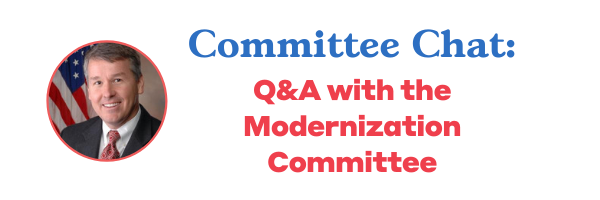As partisan bickering and political divides continue to dominate headlines, it’s easy to forget that positive things are happening in Congress. Despite this, progress is being made, including on the Modernization Committee—one of the few truly bipartisan committees in Congress.
So, what can Congress as a whole learn from the Modernization Committee’s bipartisan leadership and its members? And what’s next for the committee as it works to find ways to make Congress work better for the American people?
We sit down with committee member Rep. Rob Woodall (R-GA) in the next edition of our series, “Committee Chat: Q&A with the Modernization Committee.” Check out the Q&A below!

1. Can you tell us more about your personal background? What kind of experiences did you have before being elected to Congress and how did that perspective help prepare you for what you are doing now?
I started my career on Capitol Hill in 1994, working full-time as a legislative correspondent for my predecessor, Rep. John Linder. By 2000, I had received my J.D. from the University of Georgia and had become Linder’s chief of staff. I served in this role until Linder retired, and I took over his vacant seat in Congress in 2011.
After all these years on the Hill, more than two decades in total, I have been able to observe the procedures of Congress from a variety of different perspectives. I believe this extensive Hill experience makes me particularly qualified to contribute meaningful recommendations to the committee.
2. What do you hear from constituents back home? Do they feel that Congress works well? What kinds of suggestions do they make to you?
I receive a lot of feedback from my constituents back home, and some of their comments discuss the exact issues our committee is responsible for addressing. My district has concerns about the large amounts of money in politics, the absence of civility between opposing parties, and the lack of transparency in our legislative process. There are some great suggestions to fix these issues, and I use this advice to develop my recommendations for the committee.
3. From your standpoint, what’s one do-able thing that you think the committee can tackle in the near term and longer-term?
I believe everything the committee has tackled thus far is “do-able” in the near term. The 29 recommendations we have created are not complex, and if you read down the list, you will see that these ideas are simple and make clear improvements to our outdated procedures. But looking down the road, I hope our committee can discuss the more deep-seated issues within Congress, like committee jurisdictions and the legislative calendar. Although any solutions to these issues would be far more difficult to implement, they would go a long way to making Congress more efficient and responsive to the American people.
4. The committee consists of equal number of Democrats and Republicans. How do you—and the committee—work together across the aisle? Can that tactic apply to Congress as a whole? If so, what might need to change to engender a more bipartisan environment?
Our committee is able to work across the aisle for a few reasons. For one, the select committee has a small membership. As you can imagine, it is easier to discuss solutions in a bipartisan manner when there are fewer viewpoints to contend with. Secondly, like Congress as a whole, each member on our committee is dedicated to working together to achieve our goals, and because there is a shared desire to improve the processes in Congress, it is easier to find compromise. And finally, and perhaps most importantly, we need to remember that the individuals we disagree with are good people. Our members treat one another with complete civility—which naturally increases our willingness and ability to work with one another.
Our committee believes that the third point—treating one another with civility—would help foster a more bipartisan environment in Congress as a whole and illustrate that Congress still works. It is difficult to work across the aisle when we are attacking one another with personal insults. If we refrain from this behavior and engage our colleagues with kindness and respect, collaboration becomes possible, and we can return to drafting bipartisan legislation on behalf of the American people.
5. Thinking ahead, what do you think success would look like for the committee? And are you optimistic, pessimistic, or somewhere in between about the potential for the congressional committees and Congress as a whole to act on the Select Committee’s recommendations?
Success would be Congress implementing the recommendations made by the committee, and I am somewhat optimistic this will happen. Our colleagues have taken our recommendations seriously and are currently in the process of developing legislation. In the end, it is ultimately leadership’s decision whether or not to bring these bills to the floor, and I believe there is a will for change in the House that will compel them to do so.
6. Finally, what’s one fun fact about yourself that most people would find surprising?
I like to brew my own kombucha tea!